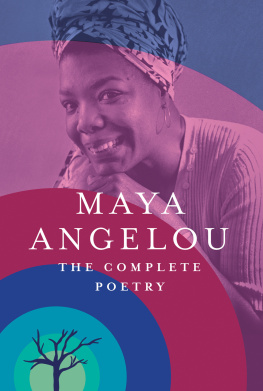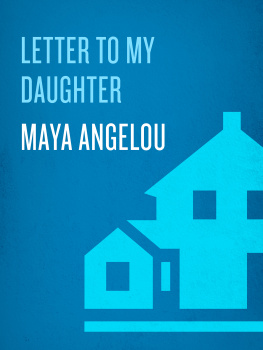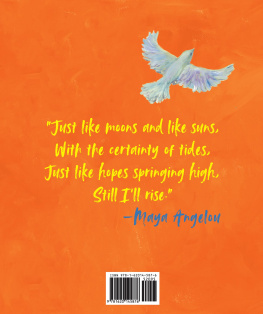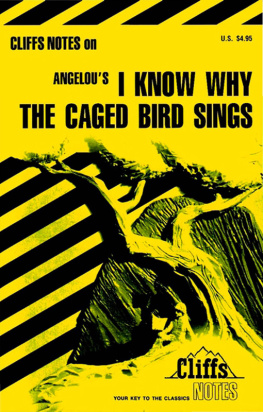Angelou - Gather Together in My Name
Here you can read online Angelou - Gather Together in My Name full text of the book (entire story) in english for free. Download pdf and epub, get meaning, cover and reviews about this ebook. City: New York;United States, year: 2009, publisher: Random House Publishing Group, genre: Detective and thriller. Description of the work, (preface) as well as reviews are available. Best literature library LitArk.com created for fans of good reading and offers a wide selection of genres:
Romance novel
Science fiction
Adventure
Detective
Science
History
Home and family
Prose
Art
Politics
Computer
Non-fiction
Religion
Business
Children
Humor
Choose a favorite category and find really read worthwhile books. Enjoy immersion in the world of imagination, feel the emotions of the characters or learn something new for yourself, make an fascinating discovery.

- Book:Gather Together in My Name
- Author:
- Publisher:Random House Publishing Group
- Genre:
- Year:2009
- City:New York;United States
- Rating:3 / 5
- Favourites:Add to favourites
- Your mark:
- 60
- 1
- 2
- 3
- 4
- 5
Gather Together in My Name: summary, description and annotation
We offer to read an annotation, description, summary or preface (depends on what the author of the book "Gather Together in My Name" wrote himself). If you haven't found the necessary information about the book — write in the comments, we will try to find it.
Gather Together in My Name — read online for free the complete book (whole text) full work
Below is the text of the book, divided by pages. System saving the place of the last page read, allows you to conveniently read the book "Gather Together in My Name" online for free, without having to search again every time where you left off. Put a bookmark, and you can go to the page where you finished reading at any time.
Font size:
Interval:
Bookmark:
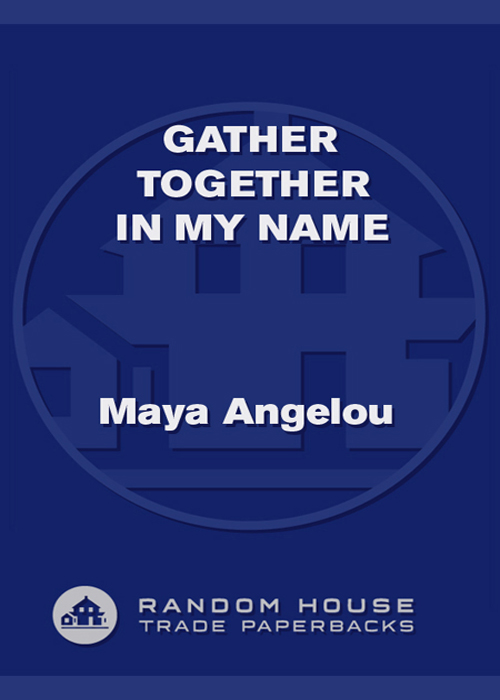
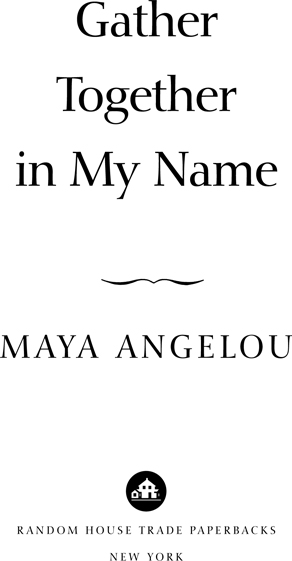
2009 Random House Trade Paperback Edition
Copyright 1974 by Maya Angelou
All rights reserved.
Published in the United States by Random House Trade
Paperbacks, an imprint of The Random House
Publishing Group, a division of Random House, Inc.,
New York.
R ANDOM H OUSE T RADE P APERBACKS and colophon are
trademarks of Random House, Inc.
Originally published in hardcover in the United States by Random House, an imprint of The Random House Publishing Group, a division of Random House, Inc., in 1974.
If You're a Viper on pages 114-115 by Rosetta Howard, Horace Malcolm and Herbert Moran. Copyright 1938 MCA Music, a Division of MCA, Inc. Copyright renewed and assigned MCA Music, a Division of MCA, Inc. Used by permission. All rights reserved.
eISBN: 978-1-58836-923-9
www.atrandom.com
v3.0_r1
It was a come as you are party and all y'all come. If you bring your own bottle, you'll be expected to share; if you don't it's all right, somebody will share with you. It was triumph and brotherhood. Everybody was a hero. Hadn't we all joined together to kick the hell out of de Gruber, and that fat Italian, and put that little rice-eating Tojo in his place?
Black men from the South who had held no tools more complicated than plows had learned to use lathes and borers and welding guns, and had brought in their quotas of war-making machines. Women who had only known maid's uniforms and mammy-made dresses donned the awkward men's pants and steel helmets, and made the ship-fitting sheds hum some buddy. Even the children had collected paper, and at the advice of elders who remembered World War I, balled the tin foil from cigarettes and chewing gum into balls as big as your head. Oh, it was a time.
Soldiers and sailors, and the few black Marines fresh from having buried death on a sandy South Pacific beach, stood around looking proud out of war-wise eyes.
Black-marketeers had sped around a million furtive corners trying to keep the community supplied with sugar, cigarettes, rationing stamps and butter. Prostitutes didn't even take the time to remove their seventy-five dollar shoes when they turned twenty-dollar tricks. Everyone was a part of the war effort.
And at last it had paid off in spades. We had won. Pimps got out of their polished cars and walked the streets of San Francisco only a little uneasy at the unusual exercise. Gamblers, ignoring their sensitive fingers, shook hands with shoeshine boys. Pulpits rang with the I told you so of ministers who knew that God was on the side of right and He would not see the righteous forsaken, nor their young beg bread. Beauticians spoke to the shipyard workers, who in turn spoke to the easy ladies. And everybody had soft little preparation-to-smile smiles on their faces.
I thought if war did not include killing, I'd like to see one every year. Something like a festival.
All the sacrifices had won us victory and now the good times were coming. Obviously, if we earned more than rationing would allow us to spend during wartime, things were really going to look up when restrictions were removed.
There was no need to discuss racial prejudice. Hadn't we all, black and white, just snatched the remaining Jews from the hell of concentration camps? Race prejudice was dead. A mistake made by a young country. Something to be forgiven as an unpleasant act committed by an intoxicated friend.
During the crisis, black people had often made more money in a month than they had seen in their whole lives. Black men did not leave their wives, driven away by an inability to provide for their families. They rode in public transport on a first-come/first-seated basis. And more times than not were called Mister/Missus at their jobs or by sales clerks.
Two months after V-Day war plants began to shut down, to cut back, to lay off employees. Some workers were offered tickets back to their Southern homes. Back to the mules they had left tied to the tree on ole Mistah Doo hickup farm. No good. Their expanded understanding could never again be accordioned into these narrow confines. They were free or at least nearer to freedom than ever before and they would not go back.
Those military heroes of a few months earlier, who were discharged from the Army in the city which knows how, began to be seen hanging on the ghetto corners like forgotten laundry left on a backyard fence. Their once starched khaki uniforms were gradually bastardized. An ETO jacket, plus medals, minus stripes, was worn with out-of-fashion zoot pants. The trim army pants, creases trained in symmetry, were topped by loud, color-crazed Hawaiian shirts. The shoes remained. Only the shoes. The Army had made those shoes to last. And dammit, they did.
Thus we lived through a major war. The question in the ghettos was, Can we make it through a minor peace?
I was seventeen, very old, embarrassingly young, with a son of two months, and I still lived with my mother and stepfather.
They offered me a chance to leave my baby with them and return to school. I refused. First, I reasoned with the righteous seriousness of youth, I was not Daddy Clidell Jackson's blood daughter and my child was his grandchild only as long as the union between Daddy and Mother held fast, and by then I had seen many weak links in their chain of marriage. Second, I considered that although I was Mother's child, she had left me with others until I was thirteen and why should she feel more responsibility for my child than she had felt for her own. Those were the pieces that made up the skin of my refusal, but the core was more painful, more solid, truer. A textured guilt was my familiar, my bedmate to whom I had turned my back. My daily companion whose hand I would not hold. The Christian teaching dinned into my ears in the small town in Arkansas would not be quieted by the big-city noise.
My son had no fatherso what did that make me? According to the Book, bastards were not to be allowed into the congregation of the righteous. There it was. I would get a job, and a room of my own, and take my beautiful son out into the world. I thought I might even move to another town and change our names.
During the months when I was tussled with my future and that of my son, the big house we lived in began to die. Suddenly jobless roomers, who lined their solemn trunks with memories before they packed in folds of disappointment, left San Francisco for Los Angeles, Chicago, Detroit, where they say jobs were begging for workers. The loud slams of the front doors were heard more seldom, and the upstairs kitchen, where the roomers exercised their cooking privileges, gave fewer and fewer of the exotic aromas which used to send me running to our kitchen for snacks.
The gamblers and prostitutes, black-marketeers and boosters, all those suckerfish who had gotten fat living on the underbelly of the war, were the last to feel the pinch. They had accumulated large masses of money, which never went into a bank, but circulated among their tribe like promiscuous women, and by the nature of their professions, they were accustomed to the infidelity of Lady Luck and the capriciousness of life. I was sorry to see the dancers gothose glamorous women, only slightly older than I, who wore pounds of Max Factor No. 31, false eyelashes and talked out of the sides of their mouths, their voices sliding around cigarettes which forever dangled from their lips. They had often practiced their routines in the downstairs kitchen. The B.S. Chorus. Time steps, slides, flashes and breaks, smoking all the time. I was fairly certain that in order to be a chorus dancer, one would have to smoke.
Font size:
Interval:
Bookmark:
Similar books «Gather Together in My Name»
Look at similar books to Gather Together in My Name. We have selected literature similar in name and meaning in the hope of providing readers with more options to find new, interesting, not yet read works.
Discussion, reviews of the book Gather Together in My Name and just readers' own opinions. Leave your comments, write what you think about the work, its meaning or the main characters. Specify what exactly you liked and what you didn't like, and why you think so.


